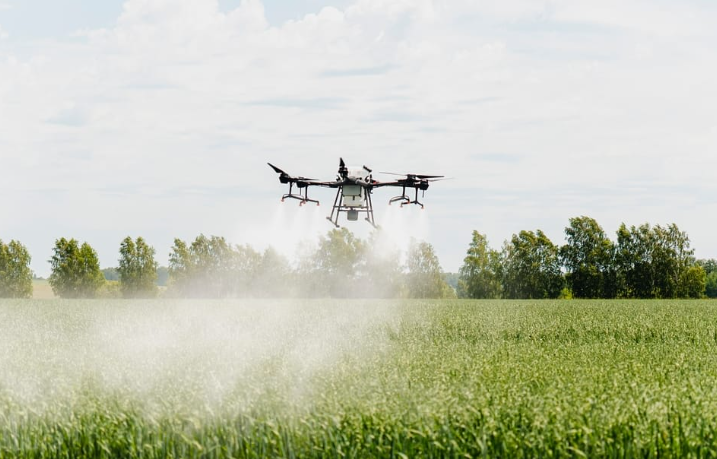The future of farming
McKinsey & Company reports that fully autonomous orchards and vineyards in the US, “can deliver more than $400 per acre per year in value, doubling to quadrupling returns on farmers’ investment in automation.” Autonomous machinery promises increased efficiency and productivity. However, this shift also presents new challenges for component manufacturers — particularly those involved in the design and performance of bearings. Here, Chris Johnson, managing director of bearing specialist SMB Bearings, discusses the unique demands autonomous agricultural equipment places on bearings.
Autonomous agricultural machinery has rapidly evolved from a futuristic concept to a tangible reality. According to the World Economic Forum, agricultural drones, autonomous tractors, and seed-planting robots are some of the innovations that could be crucial for future food supplies. These machines offer several benefits, including increased operational efficiency and higher crop yields, which can lead to a reduced environmental impact.
For instance, drones can monitor crop health and apply water and pesticides in precise amounts to avoid hefty input costs. Self-driving tractors can operate both during the day and night, planting and harvesting with pinpoint accuracy. And seed-planting robots can ensure that each seed is planted at the optimal depth and spacing, for maximum growth potential.
Agriculture has reached a point where farms have consistently adopted these technologies to improve their operations. Recently, this trend has expanded to include digital tools. According to a survey by McKinsey & Company, 21 per cent of farmers in Asia, Europe, North America and South America use farm management software. Although less than five per cent of respondents currently utilise fully automated technology, this figure is expected to increase.
Demands on bearings in autonomous machinery
Bearings are essential for smooth and efficient motion in machinery. In the context of autonomous agricultural equipment, bearings have to meet specific and heightened demands. Three primary challenges stand out for engineers: the need for higher precision; enhanced durability; and minimal maintenance.
Put simply, autonomous agricultural machinery relies on precise movements to function correctly — whether it’s a drone making minute adjustments in flight or a self-driving tractor navigating a field. Bearings must be precision engineered to support accuracy and efficiency of these operations. They must be engineered to support exact positioning and smooth rotation, ensuring all components work in harmony and execute tasks with accuracy.
Enhanced durability
Agricultural environments are notoriously harsh, with weather alone taking its toll on equipment throughout the year. Farm equipment is exposed to dust, dirt, moisture and varying temperature; and bearings are among the precision components in this machinery that must withstand these conditions without compromising performance.
Bearings with enhanced durability are essential in these applications. They must endure long operating hours and rough terrains and maintain their integrity and functionality over extended periods. To this end, selecting the right bearing means choosing the right material.
If inappropriate bearing material is used, it can lead to premature failure, increased maintenance costs and operational inefficiencies. For instance, steel bearings are prone to rust in moist conditions, leading to increased friction and the potential failure of moving parts. Such issues can halt operations and necessitate costly repairs.
Ceramic and hybrid bearings are specifically designed to withstand harsh agricultural environments and support longevity and efficiency in, for example, autonomous planters or seeders. Meanwhile, deep groove ball bearings are primarily used for radial loads in equipment like harvesting machines, but can handle smaller axial loads from both directions and perform well in high-speed operations. However, contamination in the bearing by dust, dirt and water can dramatically reduce its service life.
Instead, sealed deep groove ball bearings are an effective solution. They’re easy to maintain as the robust sealed design means they never require relubrication, which makes sealed bearings a dependable choice for these types of applications.
Source: https://engineering-update.co.uk/2024/08/08/the-future-of-farming/
Acres have a range of standard products but also support clients with custom machinery and medium-high volume products such as trolleys, stillages etc.
We have manufactured lots of different tables / workstations / workbenches for various industries.
We also manufacture access platforms, jigs and fixtures and many other types of production support solutions / products.
Talk to us today about your requirements: [email protected] / 01332695240 / Contact Us Form
Click on the icon to check out our social media! Please follow, like and share!
Want to know more about Acres Engineering?
We are based in the UK from our Headquarters in Derbyshire, England and have a European office in Malaga, Spain within the EU.
Find out more about where we have been and what we have been up to by checking out our latest blog posts.
Take a look at how we support of the Armed Forces, STEM/Schools and Charities.
As a world leader in our field, we offer a range of information guides sharing best practice with our clients.
We make it easy to engage with us, we are approved on: EcoVadis (external) / JOSCAR (external) / AVETTA (external) / COUPA (external) / SAP ARIBA (external) / DEEPSTREAM (external) ….you can download our BSI / Insurance certificates here.




![]()
![]()
![]()
Source: EngineeringUpdate.co.uk






